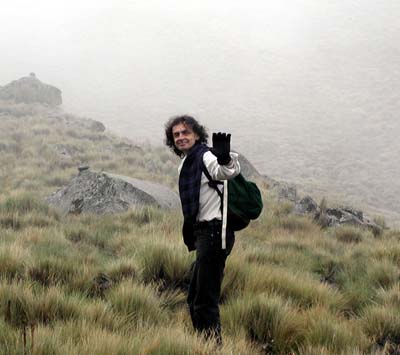Click here for Part Seven
Caracas, 17 de Abril
As we gather the huge mound of music paper bequeathed to us by these children, I feel that we have been gifted with a beyond-precious trove of artistic diamonds, and that we have on our hands a task of near-impossible dimensions. The mood of celebration lasts long enough to see the children’s bus off: Not only have they succeeded in handing us accurate (for the most part) and highly original representations of their musical minds, but they’ve decided on titles for their works and have ideas of what they will say to the audience as an introduction.
Dani and Diana have instructed the children on what to wear, and what time the rehearsal will be the next morning. Some 28 pieces by 24 local children await preparation. This does not include the five works written by our American kids in the “Bridge” (middle school) program of the VYC, to greet their Venezuelan compatriots. I am very proud of these works, since they are specifically written on Venezuelan themes composed for us by Frank Tovar, a teenage flutist in Caracas, and by Gustavo Dudamel. Five brief American pieces, yet sufficiently complex to merit their own rehearsal.
The battle plan swings into action: We gather in my hotel room, armed with room service; Pedro and Rosa notating on Sibelius software, Richard copying by hand, and me, alternately notating and keeping sense of the whole. All of us work far into the night. Pedro drives Rosa home at about 1:30am, pushing the security issue a bit. After that hour, it is not safe to be driving a car in the streets of Caracas. Caraqueños live almost in a self-imposed curfew.
Pedro returns, and continues entering scores until 6:30am. An interesting fact here is that, despite Richard working by hand, he ultimately wins the prize for preparing the most scores! Of course, Pedro has tackled the most complex pieces, so a direct comparison isn’t really fair.
So by 7:30am, everything appears to be finished. There may even be time for breakfast! Well, no, not really. There are a number of questions left to write down, that the children must answer at the rehearsal. Also, of course, the printing of the parts, the programs, and the photocopying. Dani, Diana, Vicyuly Ibarra, and staff are all on task, and it is amazing how all this is actually coming together. The Hotel Business Center is inexplicably closed, despite previous assurances to the contrary: Can the school open its offices in time for us to print out parts? Heaven and earth is moved, and all or almost all of the material is ready for the rehearsal. The children are coming soon!
The musicians and equipment all arrive on time: Daniel Gil and Kassem Smaili, violins; Gabriel Diaz, viola; María Fernanda Hernández, cello; Onilsin Rondón, flute; Juan Pablo Amorín, trumpet; Oscar Rodríguez, percussion; and of course Pedro, Richard and me. They are all fine musicians and clearly focused.
We start rehearsing the American pieces.
Within a few seconds, I realize we’re in deep trouble. Despite my expansion of the allotted time for rehearsal, there will simply not be sufficient time to prepare all the works properly. The fault is ultimately my own. Once again, the perception that children’s music would be simple and easy, is shot to blazes.The musicians work hard. Some are not used to such rapid sight-reading, but all are well-trained and dedicated.
And gradually, the music appears.
The students make their suggestions, and correct errors and oversights. Each piece has a special moment–an insight, even an astounding stroke of magic.The harmonies are surprisingly dense, the textures complex. No piece sounds anywhere near like the other. Meanwhile, Dani, as always, is circulating among the children, keeping order, caring for each child as if she/he were her very own. (In fact, Dani’s own four-year old daughter began to feel jealous, and Dani lovingly holds her while helping the others.)
After a three-hour rehearsal without a break, we finally have lunch all together just before the concert is to begin. I am torn between delight with these kids and anxiety that, no, we haven’t properly rehearsed all. The audience arrives. I am particularly moved by the fact that Mark Churchill and the Abreu Fellows have canceled their holiday plans for their last day off, just to attend this concert.
This is true support and dedication.
–Jon Deak
Click here for Part Nine
***************************************************************************************************************

**************************************************************************************************************
Jon Deak, born in the sand dunes of Indiana of East European parents, is a Composer, Contrabassist, and Educational pioneer. Educated at Oberlin College, the Julliard School, the Conservatorio di Santa Cecilia (Rome) and the University of Illinois, he joined the New York Philharmonic and served as its Associate Principal Bassist for many years, while continuing his professional composing, and studying with Pierre Boulez and Leonard Bernstein. During this time he also introduced ground-breaking performance techniques for the Contrabass, and in his orchestral writing, working with major orchestras across the country.
From 1994 – 97 he served as Composer In Residence (sponsored by Meet the Composer) with the Colorado Symphony under Marin Alsop, which is where he initiated the public school program now called The Very Young Composers (VYC).
With support from the New York Philharmonic and others, the VYC has grown steadily, winning a national award for excellence in 2004. The program has been introduced in Shanghai, Tokyo, and now in Venezuela, besides serving hundreds of children in eleven New York area Public Schools and such places as New England and Eagle County, Colorado. The New York Philharmonic has premiered 42 works for children, fully orchestrated by the children themselves, mostly under the ages of 13, as well as hundreds of chamber works in the public schools and libraries.
******************************************************************************************************
 blog | AJBlog Central | Contact me | Advertise | Follow me:
blog | AJBlog Central | Contact me | Advertise | Follow me: 

